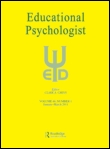 | |
| Discipline | Educational psychology |
|---|---|
| Language | English |
| Edited by | Jeffrey A. Greene and Lisa-Linnenbrink-Garcia |
| Publication details | |
| History | 1963-present |
| Publisher | Routledge on behalf of Division 15 of the American Psychological Association |
| Frequency | Quarterly |
| 11.4 (2024) | |
| Standard abbreviations | |
| ISO 4 | Educ. Psychol. |
| Indexing | |
| CODEN | EDPSDT |
| ISSN | 0046-1520 (print) 1532-6985 (web) |
| LCCN | 75646351 |
| OCLC no. | 45007061 |
| Links | |
The Educational Psychologist is a quarterly peer-reviewed academic journal published by Routledge on behalf of Division 15 (Educational Psychology) of the American Psychological Association. It was established in 1963. The journal publishes conceptual, theoretical, and review articles (including meta-analyses), rather than empirical studies, on all aspects of educational psychology and learning in formal and informal educational environments.
Contents
It is considered one of the "big five" educational psychology journals (along with Cognition and Instruction, Educational Psychology Review , Journal of Educational Psychology , and Contemporary Educational Psychology ). [1] According to the Journal Citation Reports , the journal has a 2024 impact factor of 11.4. [2]
The journal practices double-blind peer review (since at least 1979). [3]